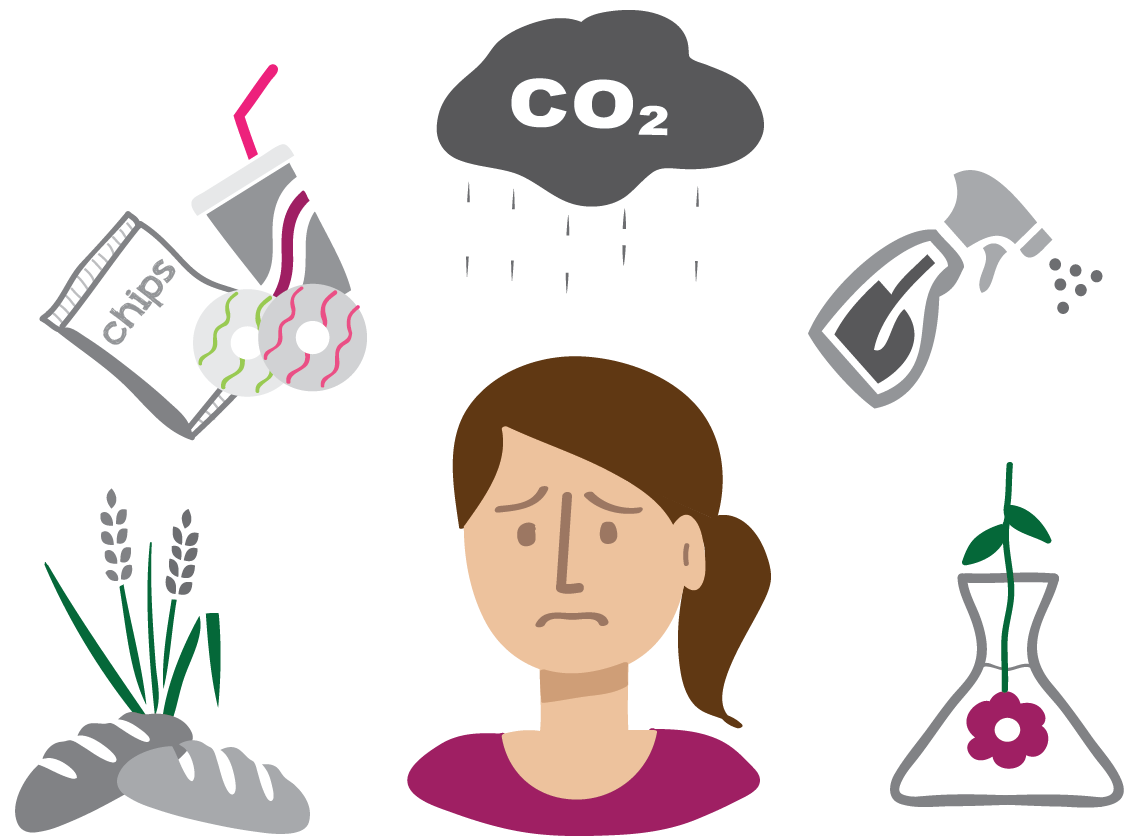Hidden toxic stressors we don't think about— Part 1
I find that toxins are a common stressor for everyone. I frequently find myself discussing cleaner options for cleaning products, cosmetics, drinking water, and food. For this reason, I decided to dig back into the Red Clover Clinic Newsletter archive and republish this updated two-part article. I hope it will motivate you to clean up your lifestyle wherever you can.
We hear more and more these days about the importance of “clean living,” but what does that mean to you? Are you aware of the many sources of toxins you are exposed to on a daily basis? Do you think something is safe just because it is on a store’s shelf, or because your doctor or dentist recommends or prescribes it?
We live in a toxic world. We are bombarded daily by toxic chemicals, metals, and microbes through our water, foods, cosmetics, cleaning products, medications, and medical treatments.
Our body is designed to eliminate the toxins that, along with metabolic byproducts, it can’t use. When the body is overwhelmed by the sheer volume of toxins it is exposed to, the system backs up and inflammation results. Persistent inflammation and the inability to detoxify are two signs of ensuing or entrenched chronic disease.
I realize I may be opening a can of worms, but my hope in this newsletter and the next is to offer food for thought so that individuals can make informed choices about what they allow their body to be exposed to. The November/December issue will offer ways to analyze how toxic your diet and environment are and what you can do to mitigate the effects.
What are signs that your body is struggling with detoxification?
Brain fog
Headaches
Fatigue
Food sensitivities
Constipation
Bloating
Nausea
Insomnia
Skin problems
Depression
Mood swings
Bad breath
Aches and pains
Hormonal dysregulation
Frequent illness
Belly fat
How can toxicity in the body be addressed?
There are two ways to address toxicity. First, we can improve the body’s ability to detoxify through things that stimulate and promote detoxification, such as supplements, herbs, homeopathy, saunas, salt baths, and enemas. Second, we can remove as many toxins as possible from our diet and environment to limit exposure. The best choice is to do some of both. If someone is truly ill, they may have to use any method possible to get their body to function normally.
The benefits of detoxification
It is important to assist your body in the detoxification process to maintain and/or improve your health. There are many things you come across in your daily life that may be increasing the toxic burden on your body, and it is good to be aware of how you can make better and safer choices. The more you control what you can, the less the stuff you can’t control, such as air pollution, will impact your health.
The benefits of making less-toxic choices:
Decrease toxic load of the body, and improve liver function
Reduce inflammation
Aid weight loss
Promote skin health
Increase energy and mental function
If you’re interested in finding out how to help your body detoxify, and what kinds of toxicity your body is struggling with, make an appointment for a Nutrition Response Testing session.
Marie's Body of Knowledge
How do you strike a blend of using Western and natural medicine for your health care needs?
Both Western and natural medicine have a place in treating our health. Sometimes it is difficult to know when and how much of each approach to utilize to strike a balance.
Western medicine is the traditional approach of a medical doctor (MD) who does a physical exam and makes a diagnosis utilizing blood tests, X-ray, MRI’s, CT scans, and referrals on to more specialized MD’s. Treatment generally consists of prescription medication, over-the-counter medication, injections, or surgery. It can also include referrals to physical therapy, occupational therapy, chiropractors, or acupuncturists.
Natural medicine is a holistic approach. Its roots reach back to ancient traditional healers, who used treatments made from natural elements in the environment.
Natural medicine practitioners may include homeopaths, herbalists, acupuncturists, and some complementary medicine chiropractors, naturopaths, physical therapists, and massage therapists. These practitioners tend to use muscle testing, through applied kinesiology, to find imbalances in the body, assess and read energy, and assess the musculoskeletal system and the internal organs. Treatment generally consists of nutritional and herbal supplements, and/or a hands-on approach to move the energy field, mobilize and manipulate the joints, and mobilize the soft tissue and internal organs.
The natural medicine approach is a wonderful way to treat the body in the most natural way. It limits chemicals from medications and gives the body the opportunity to heal itself.
However, when new symptoms arise suddenly or are not reducing or resolving within a couple weeks to a couple of months, then seeking out a Western medicine MD is part of the answer. They can determine if further testing or specialists are necessary for appropriate treatment.
If the Western MD has determined that medical treatment is unnecessary, natural medicine treatment can then be continued. Sometimes both treatments can happen simultaneously. Blending the two approaches can provide you with the best opportunity to care for your body and overall health.

